Posted by Heart Hugger on Sep 18, 2020 7:34:25 AM

The COVID-19 pandemic has impacted everyone. There are countless hospitals that are struggling to handle the demand for their services on both the outpatient and inpatient side. As a result, it is important to prioritize both hospital safety and patient safety during this time. With this in mind, there are a few steps that all healthcare professionals within hospitals should be taken to ensure that their patients, staff, and visitors are safe from harm.
Impose Restrictions on Visitors
When doctors and nurses are taking care of patients, they are taking care of not only an individual but also his or her family members. It is important to make sure that family members are updated on the progress of their loved ones. At the same time, doctors and nurses also have a duty to keep them safe from harm.
A key approach for safety is for hospitals to put restrictions in place that limit the number and frequency of visitors. The fewer people there are in the building, the less of a chance there is that this virus could spread to other people. Limiting hospital capacity can include restrictions on the number of people, when they can visit, and how long they can stay in a certain room.
Screen All Patients for COVID-19
Next, it is important to screen all patients for COVID-19, not just those with respiratory symptoms. Some of the important points that hospitals should note include:
- All patients who are arriving for both inpatient and outpatient surgeries or procedures should undergo testing prior to their arrival.
- Anyone who is experiencing symptoms of coronavirus should be asked to return home and have their procedures or surgeries rescheduled, if possible. Emergency procedures should be allowed to proceed.
- Visitors who are coming to visit loved ones in the hospital should be screened for symptoms. They should also have their temperature taken at the entrance to the hospital. If they have symptoms, they should be asked to stay home.
Following these steps can go a long way toward improving both hospital safety and patient safety.
Universal Masking and Social Distancing
Finally, it is also important for hospitals to enforce universal masking policies and social distancing. With the exception of patients who are in their hospital rooms, everyone should be required to wear a mask while they were visiting the hospital. Anyone who is unable to wear a mask due to a certain disability or medical condition should contact their physician to schedule a TeleHealth visit or discuss other accommodations.
Furthermore, hospitals need to make sure that they enforce modified seating plans in cafeterias and common areas. Signs should be placed to indicate how far apart people should sit or stand. Elevators should also be restricted to no more than two people at a time when possible to encourage social distancing.
Hospitals that are looking to improve patient safety should also invest in advanced sternal closure devices for patients undergoing cardiothoracic procedures. Heart Hugger provides an advanced sternum support harness that can include patient outcomes. Contact us today to learn more about our services!
